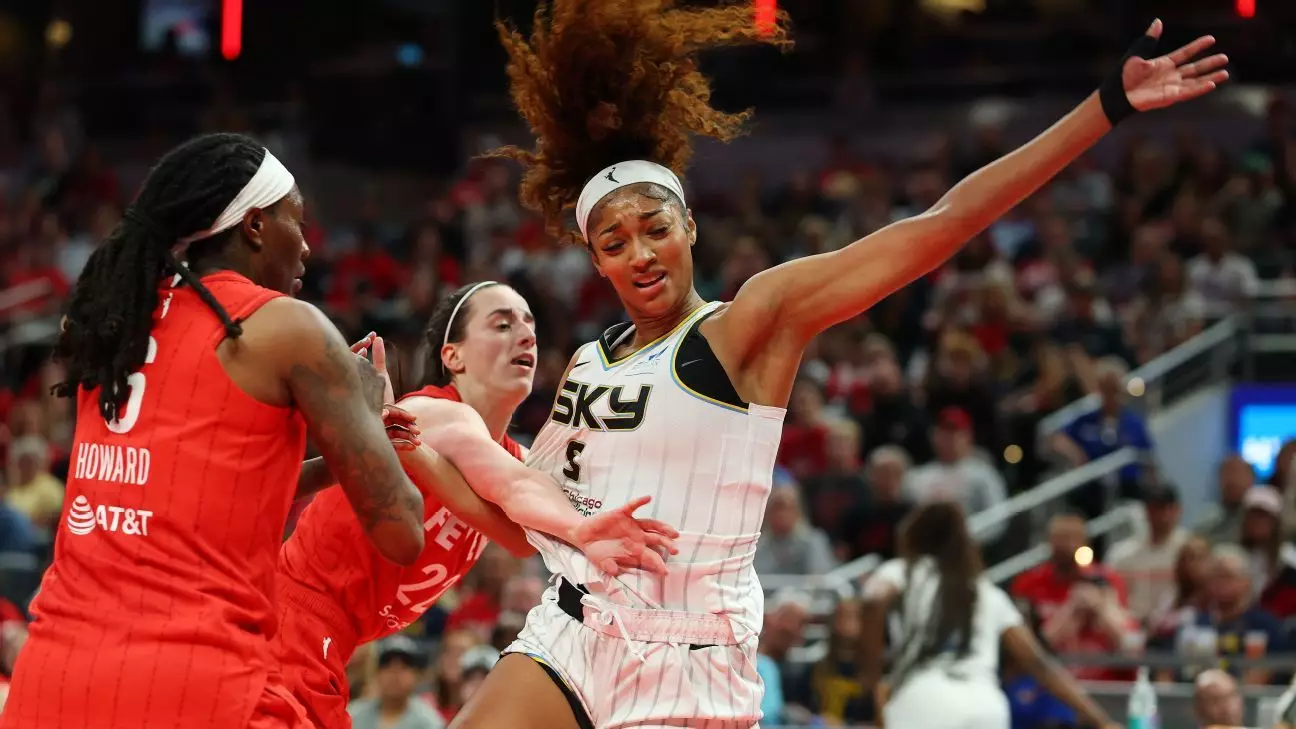The recent incident at the WNBA game between the Chicago Sky and Indiana Fever encapsulated a troubling dynamic that often simmers beneath the surface of sports. In a display that should have been purely competitive, a series of “hateful fan comments” directed at player Angel Reese painted a stark picture of how prejudice can taint the spirit of athletics. While the league has publicly condemned such behavior, it begs the question: why do we still witness such vitriol within a domain that is meant to unify and inspire?
During the tumultuous match, a critical moment arose when Caitlin Clark committed a foul on Reese, leading to a cascade of booing from the audience. The escalation didn’t merely stop at a healthy rivalry; it morphed into something much more pernicious. As Reese faced the crowd’s jeers while taking foul shots, it became painfully clear that not all fans come to sporting events with the right mindset. The WNBA’s commitment to a “No Space for Hate” policy is commendable, but the question remains: how effective can such measures be in a landscape where ignorance still flourishes?
The League’s Response and Responsibility
The WNBA’s statement, highlighting their stance against racism and discrimination, is indeed a necessary step. However, it can feel somewhat hollow if turned into mere lip service without actionable outcomes. Armchair activists will argue that condemnation is easy, but true change requires a decisive approach grounded in authenticity and accountability. If the league, along with its players’ association, genuinely wishes to eradicate hate from their arenas, they must implement rigorous measures to hold would-be offenders accountable.
WNBA Commissioner Cathy Engelbert’s assertion that basketball should act as a “unifying force” is heartwarming yet idealistic. Sports can indeed connect people from diverse backgrounds, but this unity must be explicitly nurtured by taking tangible steps to combat hateful behavior. It’s not enough to only react to incidents after the fact; a proactive strategy that involves fan education, severe penalties for misconduct, and creating a culture of respect should be prioritized.
The claim that the Indiana Fever is cooperating with the league’s investigation illustrates a necessary collaborative effort. However, history shows that goodwill can easily turn a blind eye when faced with the discomfort of confronting toxic fan behavior. Responsibility must be collectively owned—not just by the players or the league but by fans too. After all, a truly inclusive environment cannot thrive in a culture that tolerates hatred in any form.
The Need for Cultural Change
In the comments following the game, both Reese and Clark attempted to downplay the controversy as an isolated incident. While their intention was likely to diffuse tension, it instead signals a troubling normalization of unacceptable behavior. This mentality—that such instances can be categorized merely as “basketball plays”—contributes to the desensitization of what should be recognized as a major issue in sports culture. The refusal to acknowledge hateful comments as an integral part of a wider problem allows it to continue festering unchecked.
If we are serious about change, embracing a cultural shift must go beyond isolated incidents. The arena should be a sanctuary of camaraderie and respect, where athletes can perform without the potential burden of hostility from fans. It requires an overhaul of the narratives that we frequently see in sports culture—a recognition that hatred is not an accepted part of the game, but rather a cancer that must be confronted head-on.
Encouraging spectators to re-evaluate their engagement in sports must accompany any policy proclamations. If the WNBA wants to be a leader in combating disrespect and discrimination, it should spearhead initiatives that breed understanding and promote healthy rivalries rather than fueling animosity.
The journey toward a culture of respect in sports is long, but it is not unachievable. The WNBA and its dedicated fanbase can pave the way by standing firmly against hate, demanding that tolerance is not just an expectation but a prerequisite for participation in this cherished connective experience.


Leave a Reply